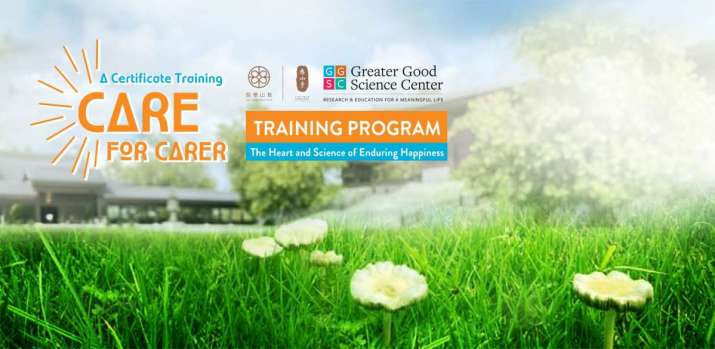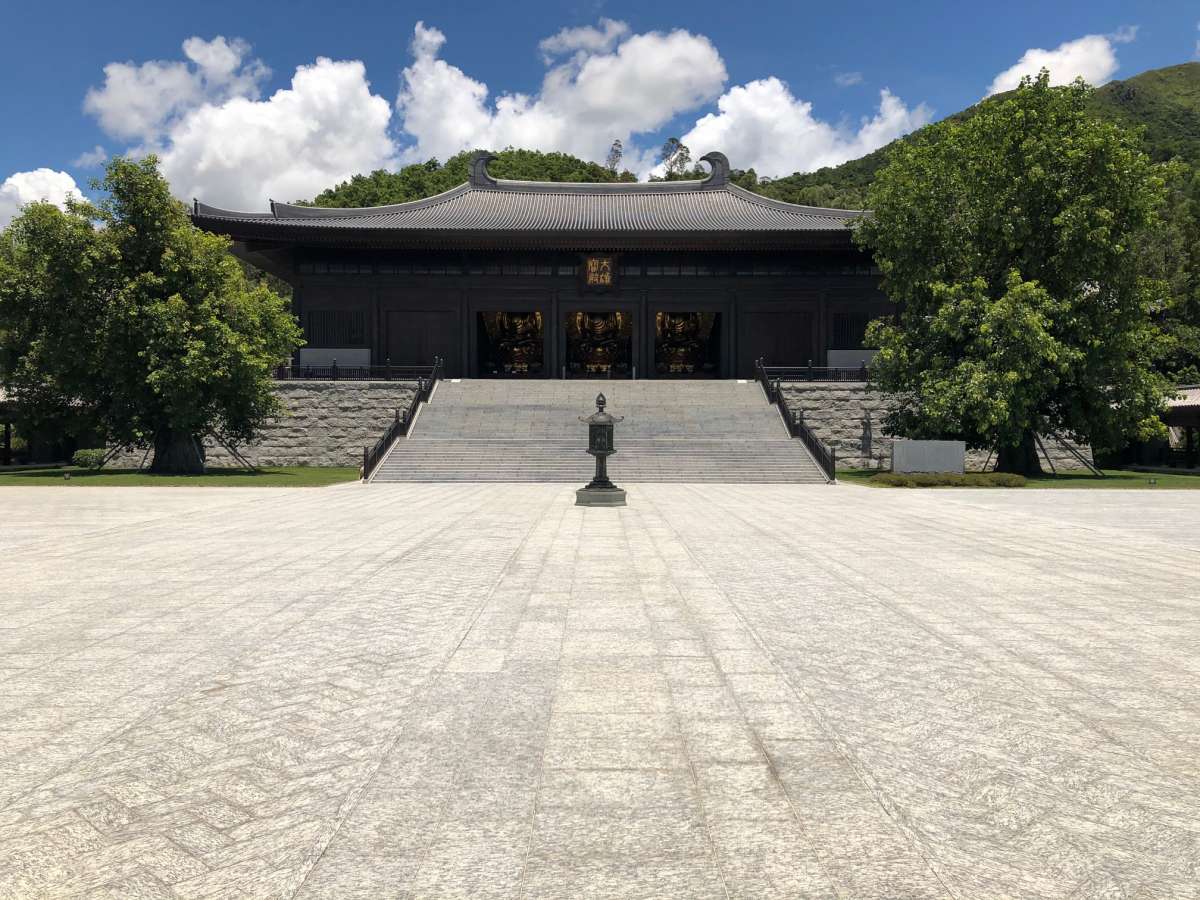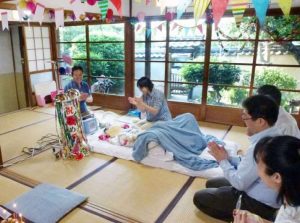
Since its establishment in 2016, Tsz Shan Monastery (TSM) has been one of the most active Buddhist organizations in Hong Kong, providing ongoing programs in spiritual mentorship and Buddhist engagement with social issues. Its research and learning division, Tsz Shan Institute (TSI), invited the Greater Good Science Center (GGSC) at UC Berkeley to launch a joint project called the Spiritual Care Training (SCT), which consists of the Science of Happiness Seminar and a training initiative with the GGSC.
Described as “a comprehensive, contextualized, and certificated program to improve the spiritual health and holistic well-being of essential service professionals and enhance personal emotions while caring for others,” the Science of Happiness seminar and multiple spiritual care trainings are being held as webinars over Zoom, characteristic of teaching modules in the COVID-19 era.
Ven. Dr. Thong Hong, abbot of TSM and academic director of TSI, and Dr. Emiliana Simon-Thomas, science director of the GGSC, shared what they hope to accomplish. Both are contributing their insights to the SCT, alternating with each other on a weekly basis, and they have unique, valuable contributions to offer in the field of Buddhist-informed pastoral activity.
“This program is based on the concept of Kindful Insight, which is really an adaptation of teaching mindfulness in Hong Kong,” said Ven. Thong Hong. “Although an international city, society still exists in an Asian context: connection, family, and community, and mindfulness cannot be atomized. It is a collective practice. We also are a bit cautious about diving in too quickly with discourse about being enlightened or emptying the mind. We share these traditional Buddhist goals, but in the footsteps of recent great Chinese Mahayana masters, we advocate a kind of humanistic Buddhism that suggests every time you help someone, you help yourself.
“In this program, you can expect an academic and scientific approach to the concepts of kindness and Buddhist wisdom, after which students will receive a certificate, approved by the GGSC at UC Berkeley, accrediting them with the skills of care that they have learned in the program. I think it’s important that elderly care homes, hospitals, psychiatric wards, and other institutions of care feel confidence and trust in the workers that attend to clients, be they professionals or volunteers,” he continued. “You could say that Kindful Insight is the teaching of the practice of loving-kindness (metta). Like Ajahn Brahm’s concept of kindfulness, it is action-oriented. We put an emphasis on daily application with a focus on subjects, and not so much on simply the breath. It’s relationship-based.”
TSM also hopes to build its portfolio of spiritual care initiatives, and Ven. Thong Hong hopes that the temple can serve as training hub for spiritual carers and trainers. “Who cares for the carer? That’s a question we’re very interested in,” he said. “The material is out there, much of it in English and based in the US. But in the very unique society of Hong Kong, you need not just translations of the material into Chinese, which we are very keen on, but also contextualization in a Cantonese culture. We hope to see ourselves as cosmopolitan and international here in Hong Kong, but we have to adapt the material to a social foundation that emphasizes the collective and communitarian dimensions of human interaction.”
Dr. Simon-Thomas noted that the science of happiness is explicitly pro-social. “Kindfulness is basically a feeling where one is concerned with the welfare of others, to reduce suffering but also to increase joy. The development we aspire toward is composed of well-being, resilience, connections, and positivity. There is so much to do with each of there: for example, resilience is all about managing setbacks and growing from failure, while positivity isn’t just die-hard optimism, but learning to experience positive emotions when things are going well.”
A common thread running through these teachings is mindfulness, which from a relational perspective might be interpreted as managing emotions productively and deftly.
Dr. Simon-Thomas, who has taught in India alongside Buddhist masters, noted that the attitude of Buddhism to science is one of a kind among the world’s great faiths: “The Buddhist narrative is already there, but scientists just put it in a different way. It’s the Buddhists that approached the scientists, inviting empirical collaboration. It’s the Buddhists that asked neuroscientists to connect nodes on their heads to measure what was happening with their brain patterns.”

From an international perspective, Dr. Simon-Thomas noted that the World Happiness Reports released by the United Nations, as well as recent interest in Bhutan’s Gross National Happiness (GNH) philosophy, have boosted interest in the programs offered by the GGSC.
“Of the 125,000 enrolled students for our first Science of Happiness webinar—an extremely encouraging total in itself—65 per cent of those students were from other parts of the world. We see that the disillusionment with the American Dream, or equivalent materialistic expectations outside of the US, is stark and severe. This re-evaluation of what matters has led to people seeking out more enriching concepts of purpose. In the fall, GGSC will be hosting a ‘purpose summit,’ which builds on our experience of developing resources and toolkits that have taken our organization far beyond its original identity as a magazine.” The magazine is still running and available online, along with separate websites for the center and the toolkits.
One major route to reducing suffering and increasing happiness, Dr. Simon-Thomas said, is bridging divides, which has been a major objective of the GGSC amid the divided political climate of the US. Another core project that the GGSC team has directed much of its time to has been releasing material on coping with anxiety, stress, and fear during the COVID-19 pandemic—especially relevant given that the aforementioned social and political division and turmoil has been exacerbated by the failure of the US to deal with the pandemic, relative to other developed economies. Hong Kong has also seen its share of epochal, convulsive events since 2019.
At the broadest level, TSM and the GGSC both hope to bring society together. At the moment, negative emotions and energy are running rampant across the world. The solution is not to withdraw from global affairs, but to explore how to connect with our inner being, family and friends, and society. Connection is about getting in touch with our negative emotions, such as anger or sadness. Perhaps most importantly, this journey to connection cannot be about “perfection.” Rather, true connection is “embracing our incompleteness.” This conscious recognition and cradling of our own imperfections is spoken of in all the world’s major religious traditions. Understanding this non-dualistic approach to the human condition will enhance our deep listening, empathy, and capability to ease suffering and pain without judgment. It will bring to all involved a sense of belonging, not just to a wider community but to their interior being.
See more
Hong Kong tycoon Li Ka-shing calls on those in power to show humanity and provide a ‘way out’ for young people in protest crisis (The South China Morning Post)














